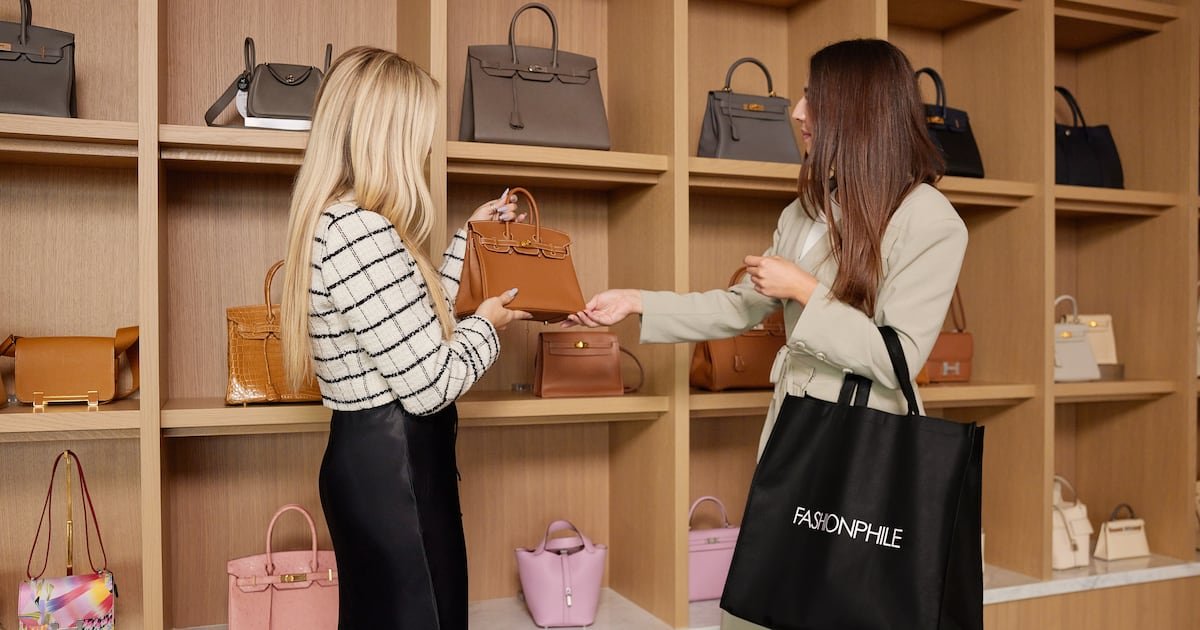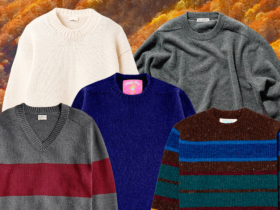Fashionphile got its start at the height of the dotcom boom in 1999, when founder Sarah Davis started selling luxury clothes from her own closet on eBay. Today over a million users sell more than $500 million worth of Birkins, Rolexes and other high-end goods on the platform annually, which launched as a freestanding website in 2007.
But to kickstart its next stage of growth, Fashionphile is now investing in a physical retail footprint, including its own stores as well as selling wholesale to other retailers such as Saks Off Fifth and duty free shops. In 2025, Fashionphile will open new brick-and-mortar locations in San Francisco, Dallas, Atlanta, Boca Raton and Philadelphia. By the end of the year, it will have a footprint of 14 outposts in various formats.
This isn’t Fashionphile’s first experiment with physical retail. The company opened stores in California starting in 2006, but moved into Neiman Marcus them after receiving a minority investment from the department store chain in 2019. Most of these locations, however, focused on serving prospective selling customers rather than showcasing inventory to shoppers, said Davis.
Some of the new stores also focus on buying, where luxury shoppers can trade in secondhand pieces for cash. Others are traditional stores in high-foot traffic areas, though every location will serve both shoppers and sellers.
Fashionphile is not the only online resale player eyeing offline opportunities. Late last year, The RealReal announced new stores in Houston and Miami, bringing its total number of stores to 15. Rebag, which has a similar business model to Fashionphile and four stores of its own, opened shop-in-shops inside five Bloomgindale’s locations in August. Last week, Rebag also partnered with Walmart to help expand the big box retailer’s offering of pre-owned luxury products via its online marketplace. Even peer-to-peer eBay-competitor Mercari ventured into brick and mortar with a storefront in Los Angeles.
Online resellers are reaching the same conclusion as many direct-to-consumer brands that started out proudly e-commerce only: there’s certain essential elements of the retail experience that simply can’t be recreated on the web.
“You can’t replicate the treasure hunt experience online,” said Cynthia Power, founder of Molte Volte, a consultancy that focuses on fashion reuse and recycling and co-host of the Untangling Circularity podcast. “If you’re in person and you find the right pre-owned piece that feels like it’s one of a kind, that conversion rate will be so much higher than if you find something online.”
Fashionphile, which launched its current retail strategy in 2021, designed its new store experiences based on luxury clienteling, according to Davis. “We said if we were going to do this, let’s really listen to the customer, and not just operate as the best reseller out there but as a luxury brand,” she said. “Luxury sales are not transactional, they’re based on relationships.”
In 2022, as part of its retail push, Fashionphile hired Chanel– and Bulgari-veteran Angela Dotson to develop its private client strategy. The ultimate goal is to operate in a way that is “fully fluid,” Davis added: to offer buyers the ability to get a quote for their products online, drop it off in the local Fashiophile store, and while they’re there, pick something new.
Simply opening a retail location is not enough to justify its costs, however. Today, a successful store doesn’t only convey legitimacy for an online operation or serve as a billboard for a brand; it’s a crucial way to differentiate a business in a market with many players with similar value propositions.
“We’ve learned how to merchandise our stores so they’re not just beautiful museums,” said Davis. “They actually are doing meaningful sales because for us, we have the right product for the feet that are walking in the door. That’s how we’ve evolved.”
The secondhand market has expanded significantly over the past decade, driven by digitally native platforms like The RealReal and Fashionphile that identified — and quickly populated — a white space for stylish, fashion-forward online shoppers. But in recent years, the rapid growth among this cohort of internet-savvy early adopters has slowed. For The RealReal, the number of active buyers have shrunken in recent quarters since a peak in 2022, from 430,000 in the three months ending Dec. 31 of that year to 389,000 in its third quarter last year.
All the while, online resellers are increasingly competing with traditional brick-and-mortar secondhand retailers, whose businesses have also flourished in recent years. For instance, Winmark Corporation, the owner of thrift chain Plato’s Closet, saw sales climb nearly 50 percent and net income by one-third between 2018 and 2023. Meanwhile, Japan-based luxury consignment shop 2nd Street plans to more than double its footprint in the US to 100 stores by 2029.
“We’re kind of realising as we go into a later stage of the business that there’s millions of shoppers out there who would love what we have to offer but they’re not aware of what’s out there in luxury resale e-commerce,” said Ben Hemminger, co-founder and CEO of Fashionphile. “Retail is a way to get in front of them.”
Traditional retailers including department stores and even big box chains have become new champions of luxury resale in recent years, said Charles Gorra, founder and chief executive of Rebag.
Arkansas-based department store chain Dillard’s has been offering secondhand bags from brands like Chanel and Prada since at least 2017 through a partnership with What Goes Around Comes Around, a stalwart in the luxury consignment space. Selfrides has a similar offering via Vestiaire Collective. Now, with Bloomingdale’s and Walmart in the mix, their online resale vendors are able to reach a broader range of customers.
“We’ve spent many years establishing our primary platform, which is the Rebag [website] and our stores, but now we’re in the next chapter of magnifying that,” he said. By partnering with established retailers, Rebag can reach new “ecosystems of customers” outside the fashion hotbeds in New York, California and Florida, Gorra added.
Wholesale has been an avenue for Fashionphile to enter international markets. Its products are now sold in German department store Galeria Karstadt Kaufhof, for instance.
Fashionphile bet big in the wholesale category with its acquisition of Canadian B2B resale company LXRandCo, Inc. in November 2023. LXR specialised in selling secondhand designer handbags to department stores such as Lord & Taylor and Century21. Fashionphile acquired its intellectual property as well as remaining inventory after LXR filed for bankruptcy.
“It’s a big undertaking to go international, and to choose where to go or determine whether there’s demand there,” said Hemminger. “Wholesale allows us to kind of dip our toe in the water of some international markets.
Today, Fashionphile has a presence across Europe and on cruise ships. Retail and wholesale made up about 30 percent of sales last year, and could account for half of the business in the future. Hemminger added.









Leave a Reply